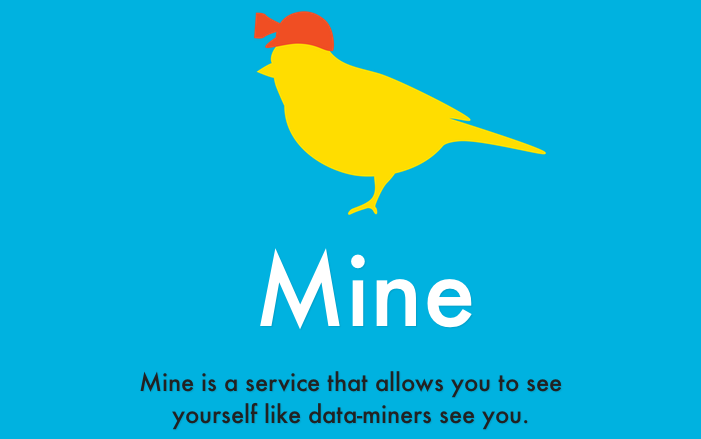Check out coverage of Mine on PBS Idea Lab
5 Civic Projects Aim to Make Data Useful

How can we use data to improve our lives, our communities, and the world at large? At the recent Microsoft Design Expo, students from eight universities showcased design projects along the theme of “making data useful.” To prepare for the Design Expo, students take a semester-long course, in connection with a liaison at Microsoft Research. The best projects were then selected for presentation here at Microsoft.
“How can we use data to improve our lives, our communities, and the world at large?”
Mine: See & Control What Data-Miners See About You
Mine is by Omer Shapira, Carl Jamilkowski, Donna Miller Watts and Michael Rothman at NYU’s ITP program, advised by Clay Shirky, Robert Dietz, and Jenny Rodenhouse.
How are companies using our data? The students tell us the story of Sharon, a 31-year-old woman who’s looking for a house. How will data about her influence her credit rating and insurance rates? Whenever she goes to the pub, she posts it to Foursquare. Whenever she tweets about spending, her banks make a note of it.
Companies are making money from Sharon’s data; how can she understand what data they’re collecting and take control of that data?
To understand the judgments that people make about others online, students did interviews in person and with Mechanical Turkers, showing Turkers photos from social media and asking them to make judgments about other people. In one case, people were shown two images, a “regular” looking guy and a guy posing with a bunny. “Who would you share data with?” they asked. In another study, they found that respondents would be more likely to lend their phone to a drunk woman than a serious-looking one.
These surveys inspired Mine, “a service that allows you to see yourself like data-miners see you.”

To use Mine, first give it access to your social media accounts. When it tells you what a system might guess about your character from your data, Mine gives you a chance to choose what to highlight and hide.
One of the attendees asked: At what point does data privacy become an arms race between data collection and data privacy? Answer: If we educate the public about data mining, then maybe we can come up with arrangements where people take more control of their data, which may include having them sell their data.
[Note: Mine is a very sophisticated version of what Mike Ananny calls “folk theories” of algorithms. It doesn’t necessarily reveal what data miners are actually doing, but it does illustrate what might be done.]